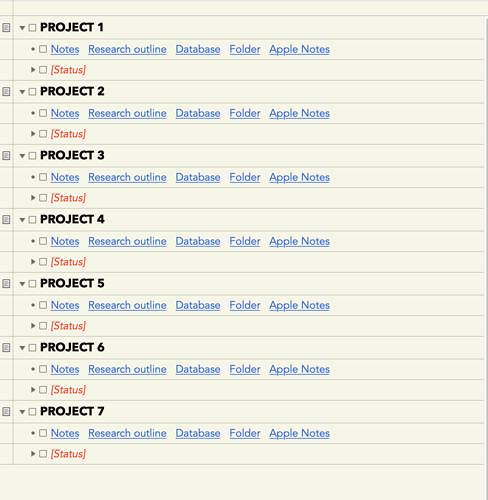For daily notes, I used to use Evernote, but it got clunky and no longer is indexed by Spotlight (which was a dealbreaker for me), so I switched to Apple Notes. Notes has tags, syncs everywhere, works just fine. It’s not perfect, but it’s more than good enough and creates as little friction for me as possible.
One of the things I liked about Evernote that Apple Notes does: when I do a search - basically, filtering all my notes to show me just those with a certain Tag or search string - I get a list of appropriate files that show the Created Date as well as the title of the note. I find that very helpful in scanning the results, and surprisingly, a lot of other note-taking apps don’t do that. (Everybody has one particular thing that they fixate on in how they use or evaluate and app, and for whatever reason, that’s one for me.)
For organizing research and projects, I use DevonThink Pro. It’s fantastic. Finder on steroids. And more. Also rock-solid.
All of my research - books, magazine, websites, docs, photos, etc - go into DevonThink, which turns them into searchable PDFs, and uses its own AI to make connections among them. Items are stored in their native formats, so if DT disappeared tomorrow, everything in it would be effortlessly retrievable. It has great tools for annotating, and adding metadata … you can replicate a document into multiple folders (basically links that look like the original doc) … and you can index files on your hard drive so it looks like they’re in DT, but they’re still on your hard drive and you didn’t have to eat up hard drive space by copying them into DT. There are lots more reasons why I love DT - including a highly responsive development team and an active, helpful userbase - but these are just a sampling.
As for Tasks, long ago I actually used to use OmniOutliner. It worked very well, but when OmniFocus came out I switched to that. OmniFocus is an extremely well made app - powerful, reliable and feature-rich. But … I found myself liking it, but never loving it. I respected it more than I enjoyed it. Something about the interface … it always felt cluttered to me. It seemed to me that it looked more complicated that it needed to. When Things (by Cultured Code) came along, I tried that and found that I did really love it. It’s elegant, and - for me - a much more pleasing environment in which to organize my tasks.
I recognize that there are people whose workflows and use needs require OmniFocus, and I totally get it. For them, there’s nothing better. But I find that Things does everything I need, in a style I prefer, and I’m happier using it.
Two other apps that I can’t live without: Keyboard Maestro, to create macros that I use all the time - and Hook, to create links. My OmniOutlines are full of Hook links, making the outlines even more useful and efficient for me.
Hope this helps.

